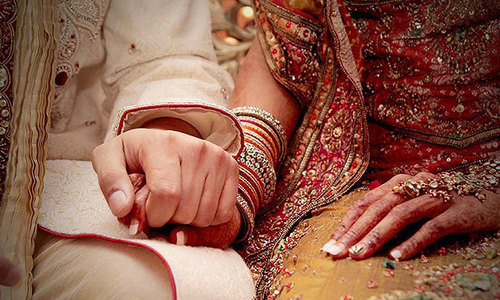CONTROLLING women’s sexuality to uphold antediluvian notions of family honour is a common motivation for forced marriages that end in violence, rape and even murder.
On Wednesday in a landmark judgement, a British court found a mother guilty of deceiving her teenage daughter into travelling to Pakistan and forcing her to marry a much older man.
Even more horrific was that the man in question was the same maternal relative who had raped her on a previous visit to Pakistan.
Only aged 13 at the time, she had to undergo an abortion to terminate the resultant pregnancy.
The verdict finally sends a strong message that victims’ voices will be heard and that there are consequences for those who coerce them into marriage.
Despite a 2014 law criminalising forced marriages in the UK (even those conducted abroad involving British nationals), few cases are reported.
This is attributed to complex, patriarchal family structures that traverse countries, and make it difficult to seek help if the upshot is that parents could go to jail.
Because many girls from diaspora communities are taken abroad during school vacations to get married, teachers and even airport staff are instructed to watch out for signs of distress.
The fear is real.
Refusal to obey parents in such matters can attract the ultimate retribution.
The recent murder of Sana Cheema, an Italian-Pakistani tricked by her family into travelling to Pakistan to be married, is a case in point.
According to the UK’s Forced Marriage Unit, Pakistan, with 439 cases, ranked the highest among the top four ‘focus’ countries in 2017, followed by Bangladesh, Somalia and India.
The adherence to such oppressive practices is linked partly with the high prevalence of arranged marriages among second and third generation Asian immigrants with spouses from their country of origin.
This trend has encouraged ghettoisation and impeded integration for decades.
Coupled with poor employment prospects, a lack of language skills and education among immigrants — especially among Pakistanis and Bangladeshis who come to the UK through such arranged marriages — the result is further socioeconomic isolation from the mainstream.
Clearly, instituting strategies to foster multiculturalism is essential but the British government must do more to address the underlying reasons that perpetuate imported misogynistic practices.
A forced marriage is not a cultural matter but a criminal offence that must be investigated, even if collaboration from other governments is necessary, so that those at risk are protected.
Published in Dawn, May 24th, 2018













































